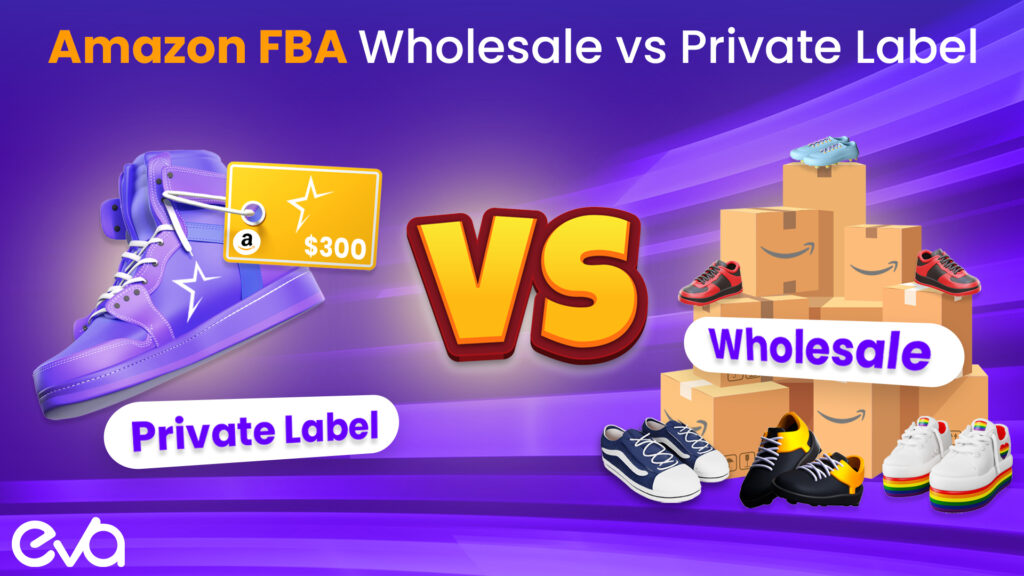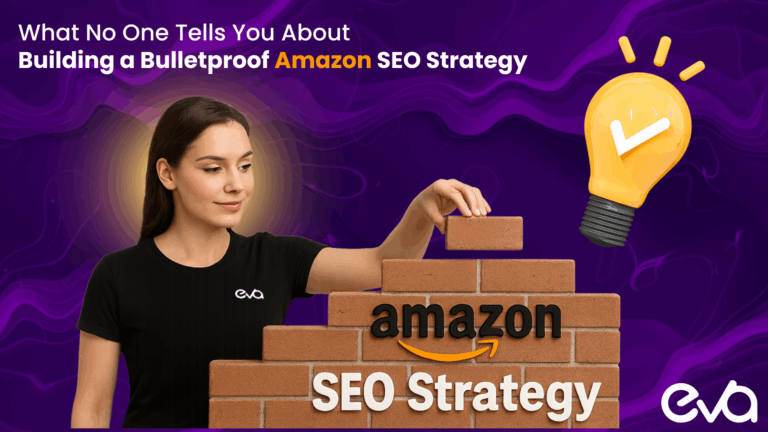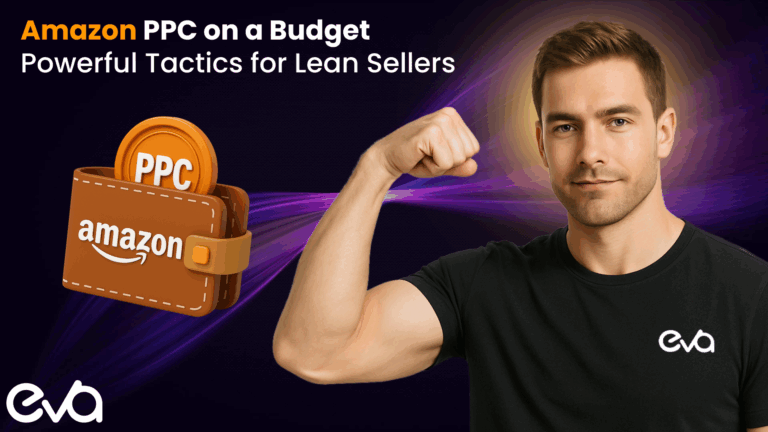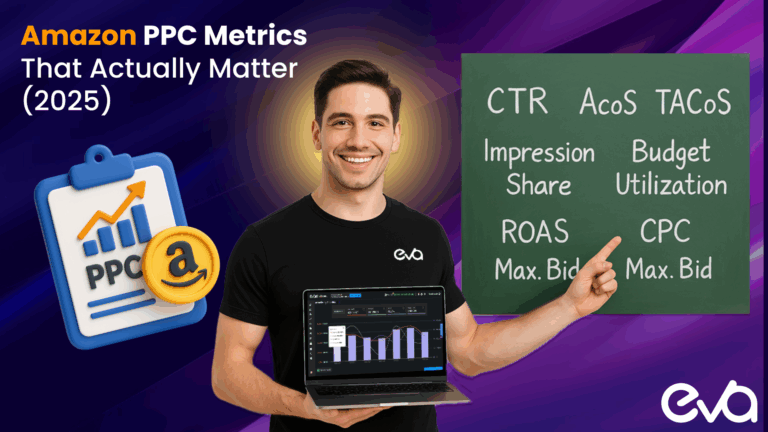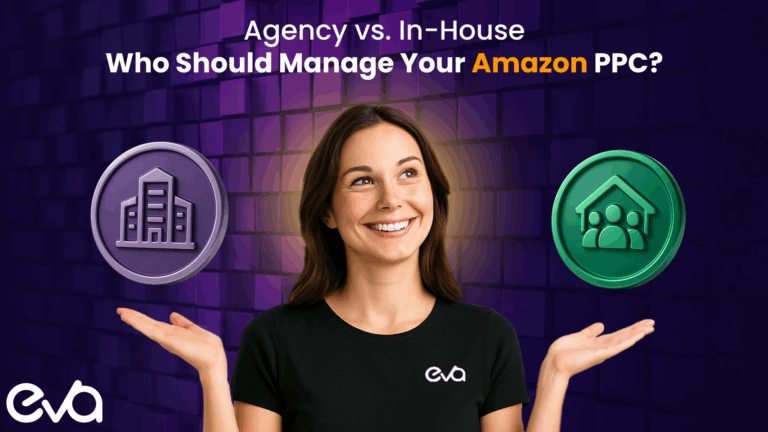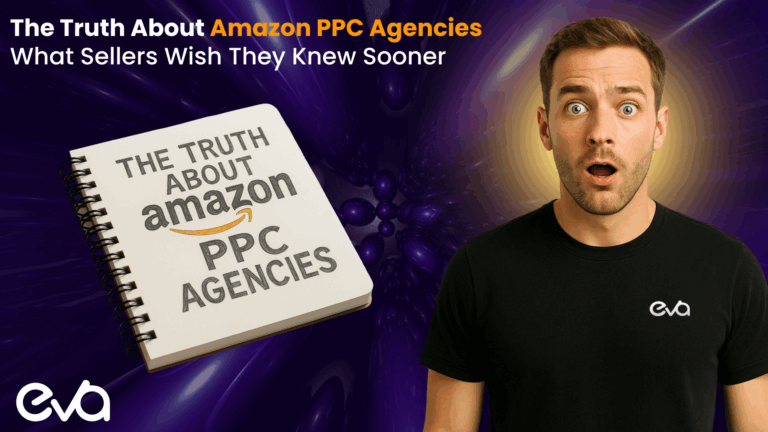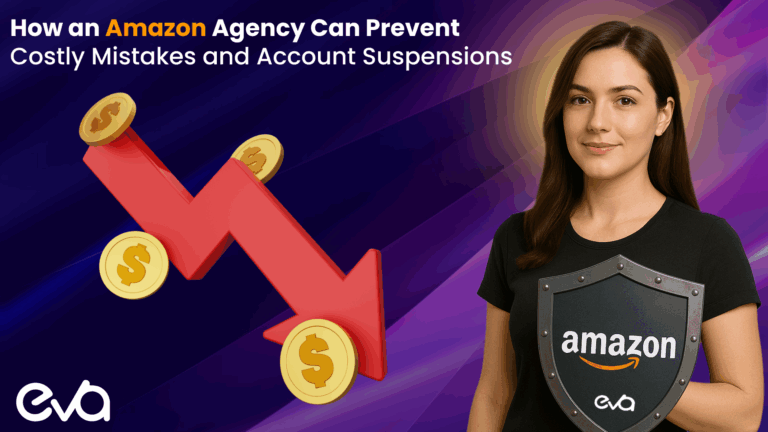When launching your Amazon selling journey, one of the most consequential decisions you’ll face is choosing between two dominant business models: Amazon FBA Wholesale or Private Label.
This choice will fundamentally shape your operational approach, investment requirements, and long-term growth potential.
The decision isn’t simply about which model is “better,” but rather which aligns with your specific goals, resources, and risk tolerance.
This post takes a close look at both platforms.
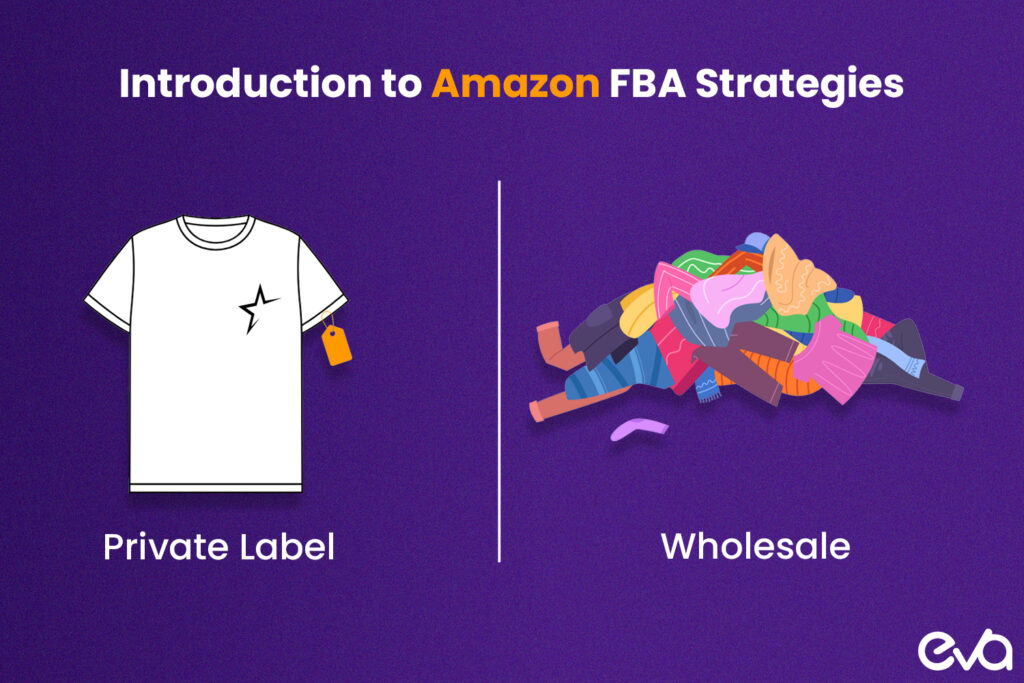
Table of Contents
- What Is Amazon FBA Wholesale?
- What Is Amazon Private Label?
- What Is the Difference Between Amazon Private Label and Wholesale?
- Which Model Is Right for You? Key Considerations
- Hybrid Approaches: Combining Elements of Both Models
- Operational Considerations: Setting Yourself Up for Success
- Making Your Final Decision: Action Steps
- Beyond the Business Model
- How Eva Can Help
- FAQs
What Is Amazon FBA Wholesale?
Amazon wholesale FBA is a program that allows Amazon sellers to source products from wholesalers and has those products fulfilled by Amazon.
Amazon takes the best care of the products’ storage, shipping, and customer service, so the seller only needs to worry about sourcing products and generating sales.
Amazon’s vast customer base and world-class fulfillment network make it an appealing option for sellers looking to scale their businesses.
And because Amazon charges fees based on the size and weight of the products being fulfilled, it’s generally more cost-effective to use Amazon’s fulfillment services for larger or heavier products.
If you’re selling smaller items, you may be able to save money by fulfilling orders yourself. But if you’re selling products that require Amazon’s fulfillment expertise, then wholesale is definitely worth considering.
| Comparison Factors | Selling Wholesale on Amazon | Selling Private Label on Amazon |
|---|---|---|
| Product Ownership | Reselling existing brands’ products | Creating and owning your own brand and products |
| Brand Control | Limited control over branding and packaging | Full control over branding, packaging, and customer experience |
| Competition | High competition from other sellers | Lower competition as you build a unique brand and product line |
| Profit Margin | Lower profit margins due to price competition | Higher profit margins as you set the price and control costs |
| Inventory Management | Relies on suppliers for inventory | Full control over inventory management and product availability |
| Product Differentiation | Limited ability to differentiate from competitors | Ability to create unique and innovative products |
| Marketing Strategy | Focus on price competitiveness and availability | Build a strong brand identity, target niche markets, and market effectively |
| Product Development | No involvement in product development | Opportunity to develop and improve products based on customer feedback |
| Supplier Relationships | Need to establish relationships with suppliers | Greater control over the supply chain and relationships |
| Risk and Investment | Lower risk and investment as you don’t own the brand | Higher risk and investment in branding, product development, and marketing |
| Long-Term Potential | Limited scalability as you rely on suppliers | Higher scalability as you build a recognized brand and loyal customer base |
How Does Amazon Wholesale FBA Work?
Under the program, Amazon acts as a middleman between the business and the customer, taking care of storage, shipping, and customer service.
This arrangement can benefit businesses that don’t want to deal with the hassle of setting up their own eCommerce platform.
However, it’s important to note that Amazon does charge fees for its services. So businesses need to carefully consider whether the wholesale is right for them.
Wholesale can be a great way to get your products in front of Amazon’s massive customer base. But you need to weigh the costs and benefits to decide if it’s right for your business.
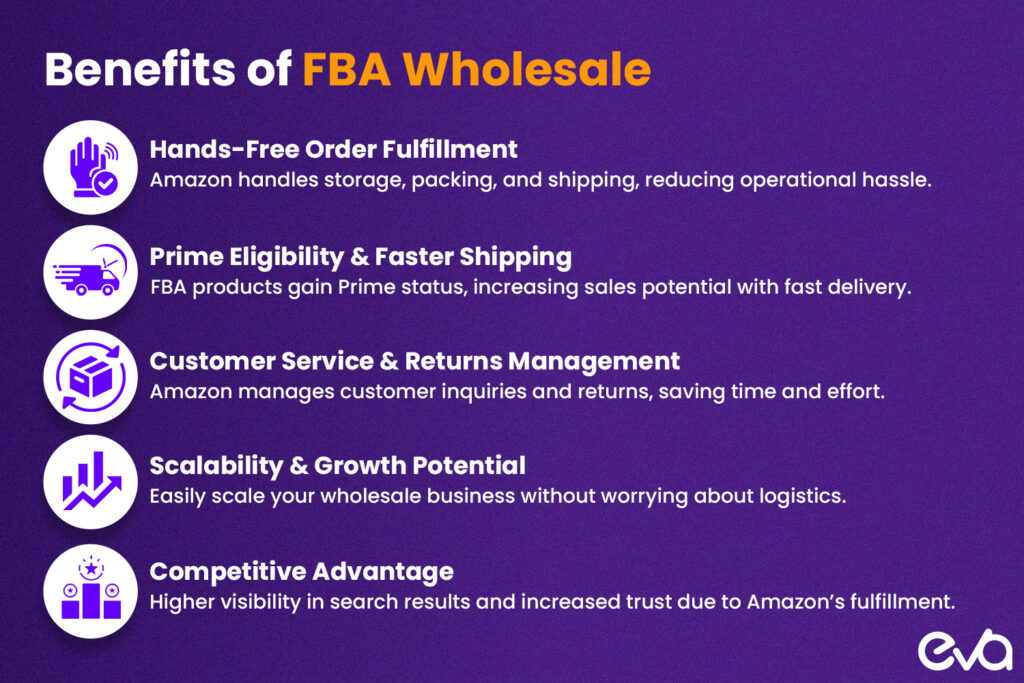
What Is Amazon Private Label?
On an Amazon private label business, you can only sell products that you legally own. To put it another way, a private label company sells the product on Amazon under its own brand name. It could be products you manufacture or white label products purchased from a vendor.
As a private label retailer, you must brand the product before releasing it to the public. If you buy from a white label manufacturer, your supplier may share a contract with another private label company. You will not have to develop a whole new concept to sell products under your own label.
Private labeling is widely used by the world’s largest retailers, including Amazon sellers, Walmart, eBay, and Shopify.
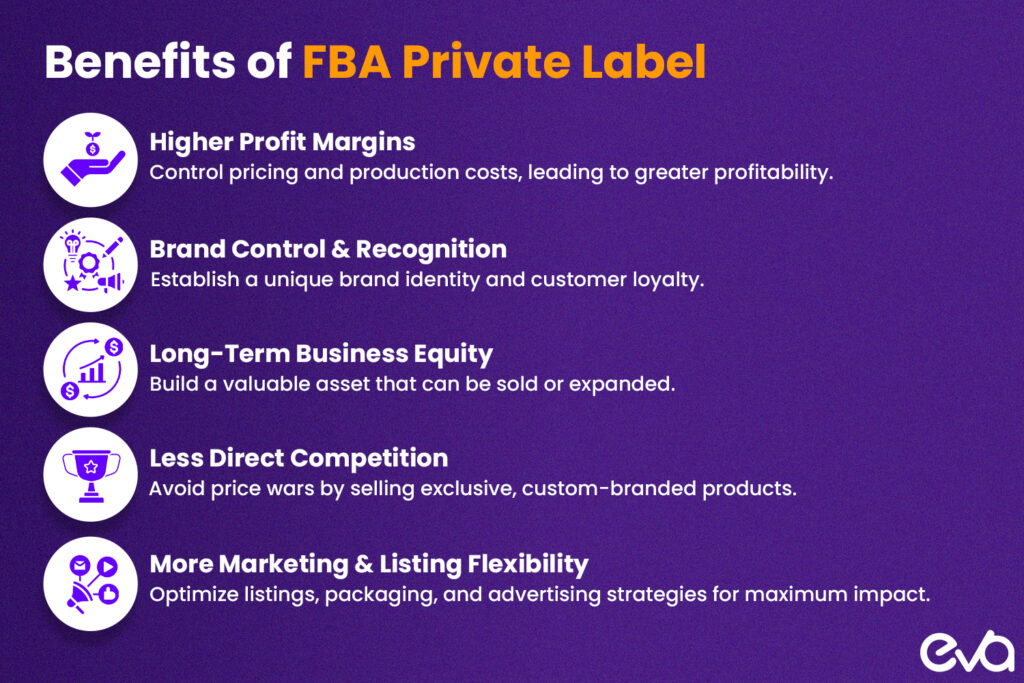
How Do Amazon Private Label Brands Work?
In a nutshell, Amazon private labeling is when a manufacturer produces products specifically for sale under a retailer’s brand. For example, let’s say you want to sell your own brand of cosmetics on Amazon.
You would find a manufacturer that manufactures cosmetics and ask them to produce a batch with your label. Then, you would ship the cosmetics to Amazon FBA warehouses or your own facility and then list them for sale on your Amazon store.
It’s really that simple! Of course, some more details are involved, such as ensuring that your product meets Amazon’s quality standards and getting it listed in their search results.
But the basic process is pretty straightforward. If you’d like to learn more about how the whole process goes, tap on the link below to read our ultimate guide.
What Is the Difference Between Amazon Private Label and Wholesale?
| Comparison Factors | Selling Wholesale on Amazon | Selling Private Label on Amazon |
|---|---|---|
| Pros | Gain access to established brands and products | Full control over branding, packaging, and customer experience |
| Lower risk and investment as you don’t own the brand | Opportunity to create unique and innovative products | |
| Easier entry into the market with existing demand | Higher profit margins as you set the price and control costs | |
| Broader range of product options to offer customers | Build a recognizable brand identity and customer loyalty | |
| Streamlined logistics with established suppliers | Greater potential for long-term scalability and brand growth | |
| Cons | Lower profit margins due to price competition | Higher risk and investment in branding, product development, and marketing |
| Limited control over branding and product differentiation | Requires more effort and resources for product development | |
| Reliance on suppliers for inventory and availability | Higher level of competition and market saturation | |
| Less room for product customization and innovation | More complex inventory management and supply chain coordination | |
| Potential brand dilution and price erosion due to competition | Requires substantial market research and targeted marketing efforts |
One of the biggest differences between wholesale and private label businesses is the level of risk involved. The risk is relatively lower with a wholesale business because the product is already known. With a private label business, you’re taking on the risk of product research, manufacturing, and marketing your own products.
Another difference is the amount of control you have over your business. With a wholesale business, you’re largely at the mercy of the manufacturers or distributors you buy from. With a private label business, you have complete control over every aspect of your product, from design to pricing.
Finally, private label businesses usually require a larger up-front investment than wholesale businesses. This is because you’ll need to cover the costs of product research, manufacturing, and marketing your Amazon product.
Benefits of Amazon FBA Wholesale
- Access to Established Brands and Products: Selling wholesale on Amazon gives you the opportunity to partner with well-known brands and offer their products to a wide customer base. By leveraging the trust and recognition associated with established brands, you can attract customers more easily and benefit from their existing marketing efforts.
Imagine selling popular electronics from renowned brands like Apple, Sony, or Samsung. Customers are more likely to trust and purchase products from these brands, leading to higher sales potential.
- Lower Risk and Investment: With wholesale, you don’t have to bear the upfront costs and risks associated with creating your own brand. You can focus on selecting profitable products from reputable suppliers, reducing the financial burden and minimizing the time required for product development.
Instead of investing in product design, manufacturing, and brand-building, you can allocate resources towards marketing, customer service, and optimizing your Amazon listings for better visibility.
- Easier Market Entry: The wholesale model allows you to enter the market quickly as you’re selling products that already have established demand. This saves you time and effort spent on researching market trends and developing new product ideas, enabling you to start generating sales sooner.
By identifying high-demand categories like home decor, fitness equipment, or pet supplies, you can source a variety of popular products from wholesalers and begin selling them on Amazon without extensive product development processes.
- Streamlined Logistics: As a wholesale seller, you benefit from streamlined logistics since suppliers handle manufacturing, packaging, and shipping. This eliminates the need for extensive supply chain management and frees up your time to focus on marketing and customer acquisition.
When a customer places an order, the supplier ships the product directly to the customer on your behalf, saving you the hassle of managing inventory, warehousing, and fulfillment logistics.
- Broad Product Range: Selling wholesale allows you to curate a diverse product range, catering to a broader customer base. You can offer a variety of complementary items, giving customers more options and increasing the likelihood of repeat purchases.
If you specialize in selling kitchenware, you can source a range of cookware, utensils, and appliances from different brands, providing customers with a comprehensive selection for their cooking needs.
Challenges of Wholesale Businesses on Amazon

- Lower Profit Margins: One of the main challenges of the wholesale model is the relatively lower profit margins compared to private label. Since you’re reselling products from established brands, price competition among sellers can drive down profit margins, making it crucial to focus on efficient operations and cost control.
If multiple sellers offer the same branded product on Amazon, the competition to offer the lowest price can lead to thinner profit margins, requiring volume sales to maintain profitability.
- Limited Brand Control: Selling wholesale means you have limited control over branding and product differentiation. You’re bound by the existing packaging and branding of the products, making it challenging to stand out in a crowded marketplace.
While you can optimize your product listings and provide excellent customer service, you won’t have the ability to customize packaging or add unique branding elements that differentiate your products from competitors.
- Reliance on Suppliers: As a wholesale seller, you rely heavily on suppliers for inventory availability and fulfillment. Any issues with suppliers, such as delays or quality concerns, can impact your ability to fulfill orders and maintain customer satisfaction.
If a supplier experiences production delays or runs out of stock, it can disrupt your supply chain, leading to delayed shipments and potential negative customer reviews or canceled orders.
Benefits Of Amazon Private Label Brands
- Full Control over Branding: Private label offers complete control over branding, allowing you to create a unique brand identity and differentiate yourself from competitors. You can design custom packaging, use your own logos, and develop a consistent brand experience that resonates with your target audience.
Building a private label brand like “EcoKitchen” specializing in eco-friendly kitchen products allows you to focus on sustainable materials, distinctive packaging, and messaging that aligns with environmentally conscious consumers.
- Opportunity for Product Innovation: Private label allows you to innovate and create products tailored to the needs and preferences of your target market. You can identify gaps in the market, conduct product research, and develop unique offerings that aren’t readily available from other sellers.
Identifying the growing demand for wireless earphones, you can develop a private label brand that offers premium noise-canceling earphones with unique features like extended battery life and customizable sound profiles.
- Higher Profit Margins: Unlike wholesale, private label allows you to set your own price, giving you the potential for higher profit margins. By focusing on value-added features, quality control, and effective marketing, you can position your products at premium prices and capture a larger share of the profit.
By positioning your private label skincare products as premium, organic, and cruelty-free, you can command higher prices compared to mass-market brands and enjoy healthier profit margins.
- Build Brand Recognition and Loyalty: Private label provides the opportunity to build a recognizable brand that resonates with customers. You can foster brand loyalty and drive repeat purchases by consistently delivering quality products, exceptional customer service, and engaging with your audience through social media and email marketing.
Example: By sharing skincare tips, offering personalized product recommendations, and building an active community of skincare enthusiasts, you can establish a loyal customer base that trusts your brand and eagerly awaits your new product launches.
Challenges of Private Label Brands on Amazon
- Higher Risk and Investment: Private label involves a higher level of risk and investment compared to wholesale. You need to invest in product development, manufacturing, branding, marketing, and inventory management. There’s also the risk of developing products that don’t resonate with the market or facing unexpected challenges during the production process.
Launching a new private label clothing line requires upfront investment in design, fabric sourcing, sample production, and marketing, which can be financially demanding and pose risks if the market response is not as anticipated.
- Intense Competition: Private label products face intense competition on Amazon, requiring effective differentiation strategies to stand out in a saturated market. Thorough market research, understanding customer pain points, and implementing unique selling propositions are crucial to gaining a competitive edge.
In the highly competitive market of smartphone accessories, differentiation can be achieved by developing a private label brand that offers premium materials, innovative features, and sleek designs that set your products apart from generic alternatives.
- Complex Inventory Management: As a private label seller, you’re responsible for managing inventory and supply chain logistics. Coordinating manufacturing, shipping, and stock levels can be challenging, especially when scaling your business or dealing with seasonal demand fluctuations.
When launching a private label brand of outdoor camping equipment, you need to anticipate peak seasons, manage production lead times, and maintain optimal inventory levels to meet customer demand while avoiding excess stock or stockouts.
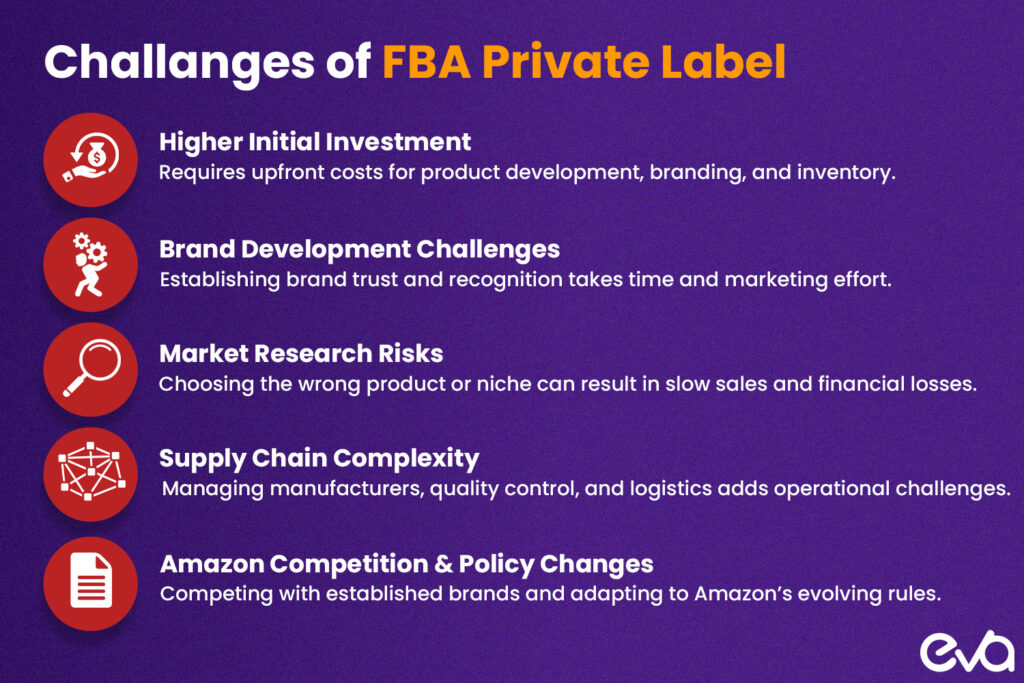
Which Model Is Right for You? Key Considerations
Deciding between Amazon FBA wholesale and private label should be based on an honest assessment of your resources, goals, and personal preferences:
Consider Amazon FBA Wholesale If:
1. You Prioritize Faster Time to Market
- Need to generate cash flow relatively quickly
- Want to test multiple products without long commitments
- Prefer working with established products with proven demand
2. You Have Limited Startup Capital
- Looking to start with a smaller initial investment
- Want to reinvest profits quickly into inventory expansion
- Prefer spreading risk across multiple products
3. You Value Operational Simplicity
- Not interested in product design and manufacturing
- Prefer focusing on sourcing and relationship building
- Want Amazon to handle most customer service issues
4. You Have Strong Supplier Networking Skills
- Comfortable negotiating with established brands
- Able to develop relationships with distributors
- Skilled at finding opportunities in competitive markets
For wholesale sellers focused on scaling efficiently, an Amazon FBA management service can provide significant value by automating repricing strategies, optimizing inventory levels, and managing brand relationships.
Consider Private Label If:
1. You’re Building a Long-Term Asset
- Interested in creating a business with potential for acquisition
- Want to develop brand equity over time
- Looking to expand beyond Amazon eventually
2. You Value Creative Control
- Passionate about product design and improvement
- Interested in brand building and customer experience
- Want to solve specific problems in the marketplace
3. You Can Handle Higher Initial Risk
- Comfortable with longer development cycles
- Have sufficient capital to weather initial launch period
- Able to adapt based on customer feedback
4. You Have Product Development Experience
- Understanding of manufacturing processes
- Ability to identify product improvements
- Knowledge of supply chain management
Private label sellers often benefit from specialized Amazon ads management services that focus on new product launches, brand awareness campaigns, and competitive positioning strategies.
Hybrid Approaches: Combining Elements of Both Models
While many sellers begin by choosing one model, experienced Amazon entrepreneurs often develop hybrid approaches that leverage the strengths of both wholesale and private label:
The Wholesale-to-Private Label Pathway
This common progression starts with wholesale to generate cash flow and market insights before transitioning to private label:
- Build Capital and Knowledge: Begin with wholesale products to learn Amazon’s systems and generate profits
- Market Research: Use wholesale selling experience to identify gaps and opportunities
- Gradual Transition: Develop private label products while maintaining wholesale revenue
- Portfolio Diversification: Eventually maintain both business models across different product categories
Many Amazon seller management services specialize in guiding businesses through this transition, helping optimize operations across both models simultaneously.
Category-Based Hybrid Model
Some sellers segment their business by product category:
- Private Label Focus: Develop private label products in categories with strong differentiation potential
- Wholesale Advantage: Utilize wholesale in categories dominated by established brands
- Strategic Allocation: Invest profits from wholesale into growing private label
- Risk Balancing: Use the steadier wholesale income to offset private label development costs
An Amazon DSP agency can be particularly valuable for hybrid sellers, providing advanced advertising capabilities that target customers across both business models with sophisticated audience segmentation.
The Brand Reseller Relationship
A more advanced hybrid approach involves:
- Exclusive Distribution: Secure exclusive Amazon selling rights for smaller established brands
- Value-Added Services: Provide marketing and optimization expertise to these brands
- Co-Development: Eventually collaborate on new product development
- Strategic Partnerships: Create win-win relationships where both parties leverage their strengths
This approach often requires dedicated Amazon seller management service support to maintain complex brand relationships while optimizing marketplace performance.
Operational Considerations: Setting Yourself Up for Success
Regardless of which model you choose, several operational factors will significantly impact your success:
Inventory Management
Wholesale Considerations:
- Regular replenishment of fast-moving items
- Managing relationships with multiple suppliers
- Balancing minimum order quantities across diverse products
Private Label Considerations:
- Longer lead times requiring advanced planning
- Higher capital tied up in single product lines
- Managing quality control across production runs
Many sellers find that Amazon FBA management services provide critical support in optimizing inventory levels, preventing stockouts, and avoiding excessive storage fees.
Advertising Strategy
Wholesale Advertising Focus:
- Competitive positioning for Buy Box share
- Defensive bidding on branded terms
- Efficiency-focused campaigns with tight ACoS targets
Private Label Advertising Focus:
- Brand awareness and product discovery
- Review generation campaigns
- Higher initial ACoS tolerance during launch phases
An experienced Amazon advertising consultant can develop customized strategies that align with your specific business model and growth stage.
Financial Management
Wholesale Financial Priorities:
- High inventory turnover rates
- Supplier payment term optimization
- Volume-based discounting
Private Label Financial Priorities:
- New product development funding
- Manufacturing deposit management
- Brand marketing investment
The best Amazon account management services typically include financial analysis components that help optimize cash flow and profitability for either model.
Making Your Final Decision: Action Steps
Now that you understand the nuances of both models, here’s a practical framework for making your decision and moving forward:
Step 1: Self-Assessment
Answer these key questions honestly:
- What is your available starting capital?
- How quickly do you need to generate revenue?
- Are you more interested in operations or product development?
- What relevant skills and experience do you bring to the table?
- What is your long-term vision for your Amazon business?
Step 2: Market Exploration
Research potential opportunities in both models:
- Identify wholesale products with reasonable competition levels
- Explore private label opportunities in your areas of interest
- Analyze the competitive landscape for both approaches
- Calculate potential ROI based on realistic assumptions
Step 3: Initial Testing
Consider starting small to validate your chosen direction:
- For wholesale: Begin with 3-5 products from 1-2 suppliers
- For private label: Start with a single product with minimal variations
- Set clear KPIs to evaluate performance
- Establish timeline milestones for decision points
Step 4: Optimization and Scaling
Once you’ve validated your approach:
- Continuously optimize based on performance data
- Reinvest profits strategically to expand your product line
- Develop systems and standard operating procedures
- Consider working with specialized Amazon account manager services

Beyond the Business Model
While choosing between Amazon FBA wholesale and private label is important, your ultimate success depends on execution excellence regardless of model choice.
The most successful Amazon sellers:
- Maintain a data-driven approach to inventory, pricing, and marketing decisions
- Stay adaptable as market conditions and Amazon policies evolve
- Focus on customer experience to drive positive reviews and repeat purchases
- Continuously optimize operations to improve efficiency and profitability
- Leverage expert support when needed through specialized Amazon seller management services
Whether you choose wholesale, private label, or a hybrid approach, remember that consistent execution, continuous learning, and strategic adaptation will ultimately determine your Amazon selling success.
How Eva Can Help
Need help optimizing your Amazon business? Eva’s team offers comprehensive Amazon seller management services for both wholesale and private label sellers, including inventory optimization, PPC management, and growth strategy development. Contact us for a personalized consultation.
FAQs
Amazon FBA wholesale involves selling established brands’ products, while private label is about creating your own brand and products.
Amazon FBA wholesale is the business model where sellers source products from established brands and use Amazon’s FBA (Fulfillment by Amazon) service to store, pack, and ship the products to customers.
Earnings for Amazon FBA wholesalers vary widely depending on factors like product selection, pricing, competition, and marketing efforts.
Success can lead to significant profits, but it’s important to focus on efficient operations and sales optimization to maximize earnings.

